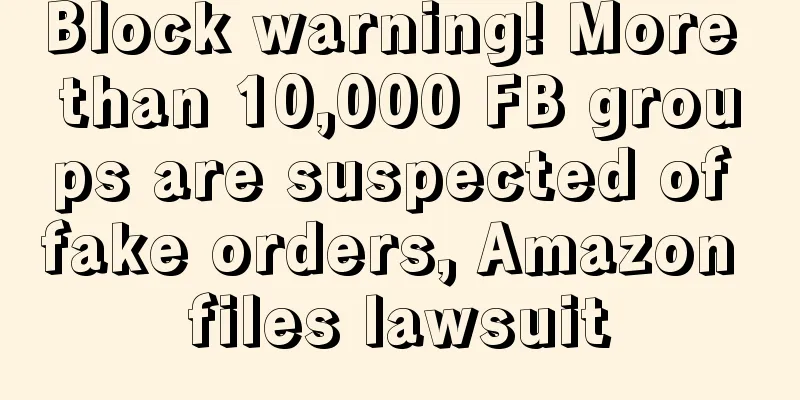Amazon has tens of thousands of misjudged links! They are being restored one after another

|
For veteran Amazon sellers, generally one or two months before Amazon Prime Day or a big sale, all the fancy operations, mergers, etc. will be basically suspended, because this time of year is a good time for Amazon to “clean up the house”; stores must be closed during every big sale, so even the most black-hat players dare not take action during this time! But just over the weekend, Amazon started to wield its "iron fist" again, and a new round of sweeping numbers came with great force! This time it was not a problem with the website system, but a problem with the review mechanism - a large number of sellers' products were mistakenly identified as living plants or seeds! Thousands of links were misidentified as plants or seeds On June 29, a large-scale link misjudgment incident broke out on the Amazon platform, saying that products were live plants or seeds outside the SEEDS_AND_PLANTS or PLANT_SEED categories, and many sellers encountered an unprecedented crisis. Product links that originally belonged to categories such as clothing, toys, cosmetics, auto parts, 3C, etc. were suddenly misidentified by the system as plant or seed products, and new and old products were treated indiscriminately! Products that were notified of the risk of removal were basically under the correct category, and did not mention words related to plants and seeds, and there was no correction. What’s even more worrying is that sellers need to deal with these misidentified links within just a few days, that is, before July 1, otherwise they will face the risk of having their links deleted. However, this incident happened to happen on the weekend, and Amazon customer service was not working, so sellers didn't know what to do. Sellers were anxious in the face of sudden problems, and help posts flooded the Amazon forum. Overseas accounts were also greatly impacted, and sellers reported that the number of misjudged links was still increasing! As of early June 30, the number of sellers and product links receiving performance notifications continued to increase. Others received performance that included 2,600 SKUs identified as seeds and plants. In this regard, some sellers speculated that the listings triggered a sensitive word in large quantities, but the vast majority of sellers believed that this was a large-scale misjudgment caused by Amazon's strengthening of the review mechanism for detecting restricted products. As of press time, some of the misjudged listings have returned to normal and their performance has disappeared. How should sellers respond to this incident? 1. Evaluate the value of the link First, we need to assess the value of the links being judged. If these links have a significant impact on the overall store performance, then immediate action is necessary. If the link value is not high, you can choose to wait and see and wait for more information or further notification. For a large number of "misjudgments and mis-scans", if the relevant sellers file a complaint, it will basically be approved quickly. If you are not in a hurry, you can wait for Amazon's technical staff to make subsequent repairs. Blind operations may have a counterproductive effect. If you are in a hurry and want to solve the problem quickly, then go to the payment manager. Normally, he will help you or ask you to wait. 2. Prepare appeal materials If you decide to appeal, you will need to prepare the following key materials to prove that the product is not a live plant or seed product: 1. Six-sided image of the product: Shoot the product from all angles to ensure that the true attributes of the product can be clearly displayed. 2. Product instructions: Provide a detailed product description that describes the product's purpose, ingredients, and other important information in detail, and clearly states that the product is not a living plant or seed product. 3. Purchase invoice: Provide purchase invoice or relevant supporting documents to ensure that the source of the product is legal and compliant. The preparation of these materials should be detailed and accurate to ensure that they can fully prove that the product is not a restricted commodity. The pictures should be clear, the text descriptions should be detailed, and the invoices and related documents should be convincing. 3. Backstage entrance complaint, operation steps: 1. In the "Submit a Complaint" field, clearly state that your product is a specific type of product and that your product is not a living seed or plant. 2. Open a case and give a POA in English with specific evidence. For example, the six-sided picture of the product, product manual, A+, details page copy, invoice, brand certificate, brand holder information, business license, etc., to prove the specific attributes of the product. 3. Finally, state your appeal and request Amazon to resume normal sales of the product. Note: POA and attached documents must be submitted in English. In addition, if the seller is sure that there is no keyword "living plants or seeds" on his page, do not modify the product page information, and do not stop selling or delete the ASIN. Submit a complaint page to explain that the product has nothing to do with "living plants or seeds", then put a screenshot of the corresponding detail page, and submit it for review. Some sellers are still worried about the deadline for appeals, so they further asked, "If the product is removed by the deadline, can it be restored?" Case replied that it can be restored as long as the appeal is completed. At this stage, sellers can do what they can first and then wait for the system to return to normal. Finally, in the face of various possible account review risks, sellers need to accurately identify potential risk points of the store and file complaints in an orderly manner to effectively resolve the crisis. Therefore, it is recommended that sellers must check their performance mailbox regularly in the near future. Once a problem is found, they should immediately take positive measures to solve it in order to maintain the normal operation of the store. |
>>: How to get dozens of orders for new products without coupons
Recommend
Topped the Amazon seller list, Anker's revenue in the first half of the year exceeded 9 billion
In 2024, Anker Innovations will still be the leadi...
Amazon buyers can check the lowest prices in history!
text Recently, Amazon announced that its Rufus AI...
Congestion at the Port of Los Angeles hits a new record! Will the global shipping system face its biggest crisis?
<span data-shimo-docs="[[20,"获悉,洛杉矶,加利福尼亚长...
Record-breaking! Google's second-quarter revenue soared 62% to $61.9 billion!
It is learned that Google's parent company Alp...
Walmart sues BJ's for stealing its self-checkout technology Scan&Go! BJ's declines to comment!
Walmart has accused rival discount store BJ's ...
Top ten popular image material websites for cross-border e-commerce!
For sellers in the cross-border e-commerce industr...
Home Depot, an American home furnishings e-commerce company, announces Q1 results! Revenue hits a record high of $38.9 billion!
<span data-shimo-docs="[[20,"获悉,据外媒报道,近日美国...
The most comprehensive knowledge base on all types of Facebook accounts on the entire web!
As we all know, Facebook advertising is a professi...
Amazon account security introduction and avoidance skills
The three biggest killers that affect account sec...
Amazon's big move: Advertisers can check shopping data from the past five years
Amazon has launched another major move this time! ...
Global layoffs: 10,000 Amazon employees "graduated", TikTok took in laid-off employees
Bidding farewell to the magical 2021, we usher in ...
Thousands of reviews were deleted overnight! How can Amazon sellers save their reviews?
We have just experienced Amazon’s series of “ acco...
What is The Hello Smile? The Hello Smile Review
The Hello Smile is a website that sells dental cle...
As a 89-year-old, I feel inspired when I see everyone discussing the two-day weekend
After reading the content, I called on the boss t...
How did a competitor achieve annual sales of 12 million USD with zero advertising? What was the operation method? Here is what I learned...
COCONINI My C position Overview of Competing Sto...









